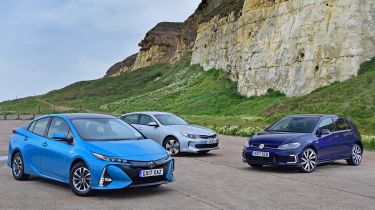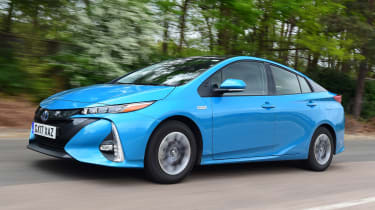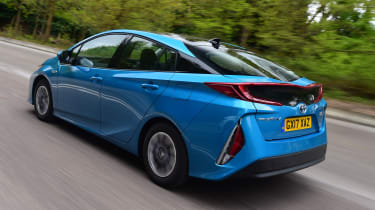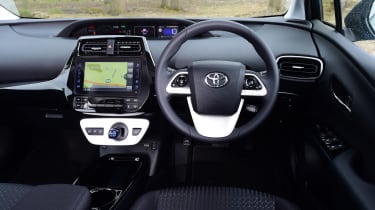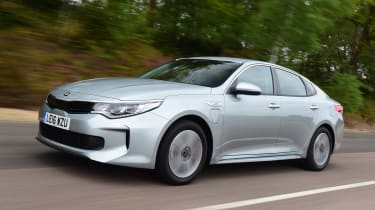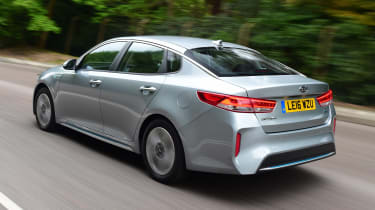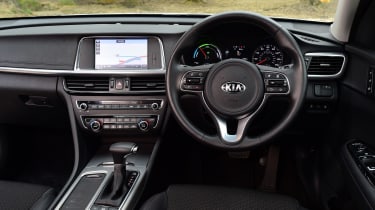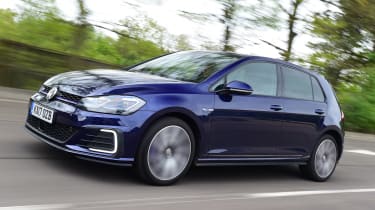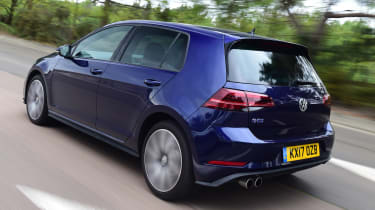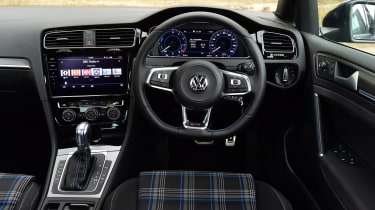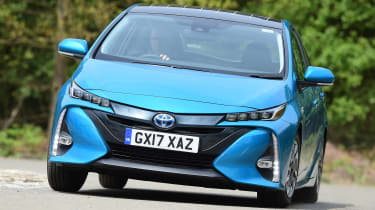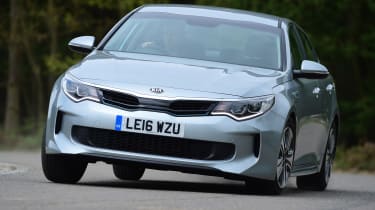Toyota Prius PHV vs Kia Optima PHEV vs Volkswagen Golf GTE
The Toyota Prius is a great hybrid, but is the new plug-in version even better? We compare it with the VW Golf GTE and Kia Optima PHEV
Electric car sales are slowly increasing, but for many buyers range anxiety remains a big hurdle. So plug-in hybrids could be the perfect answer; they combine the eco-friendly benefits of zero emissions motoring with the confidence-boosting fallback of a conventional fuel engine.
The latest model to join the fray is the second-generation Toyota Prius PHV, which follows hot on the heels of the more conventional petrol-electric model. Featuring bespoke looks, bigger batteries and an electric range that’s twice as long, the newcomer has all the on-paper credentials. Yet plug-in models are proving more popular, so before the Toyota can celebrate, it must face a pair of tough rivals.
• Best hybrid cars on sale right now
The Volkswagen Golf GTE is the ultimate mean green machine, mixing EV capability with hot hatch pace, plus it benefits from the same facelift and improvements as the standard Golf. At the other end of the scale is the Kia Optima PHEV, which packs big saloon comfort and refinement with a claimed 33 miles of all-electric running.
So which plug-in contender charges to victory in this encounter?
Toyota Prius PHV
| Model: | Toyota Prius PHV Business Ed. Plus |
| Price: | £29,195 |
| Engine: | 1.8-litre 4cyl/68kW elec motor, 121bhp |
| 0-60mph: | 10.7 seconds |
| Test economy: | 57.2mpg/12.6mpl |
| CO2: | 22g/km |
| Annual road tax: | £140 |
The second-generation Prius Plug-in (now called PHV) is a more bespoke machine than the original, which looked and drove very much like the standard hybrid. Revised looks, upgraded underpinnings, a new trim line-up and even lower running costs make the Toyota a tempting choice for those looking to cut their costs and environmental impact. Here we try the £29,195 Business Edition Plus model.
Used - available now

2020 Nissan
Qashqai
29,700 milesManualPetrol1.3L
Cash £12,197
2024 BMW
M135i
20,796 milesAutomaticPetrol2.0L
Cash £25,597
2022 Nissan
Qashqai
44,650 milesAutomaticPetrol1.3L
Cash £16,697
2021 Vauxhall
Corsa
26,674 milesManualPetrol1.2L
Cash £11,197With only 121bhp, the Toyota was unsurprisingly the slowest car here. Even its lowest-on-test 1,530kg kerbweight wasn’t enough to offset its power deficit, with the Prius taking nearly four seconds longer than the Golf to cover 0-60mph, in 10.7 seconds.
However, out in the real world, the disadvantage isn’t so obvious. Thanks to the well integrated electric motors and CVT box, the Prius has no trouble keeping up with traffic. Apply the throttle gently and it uses battery power to seamlessly assist the petrol motor; stamp on the pedal and the box sends the revs soaring.
We managed 28 miles on a full charge, which is 11 miles short of Toyota’s claims. Crucially, you can use the driving modes to retain charge in the battery, which will be useful if you have a long motorway journey followed by a drive across a city.
In pure electric mode the Prius pulls strongly and can cruise up to a maximum of 84mph. Better still, when the cells are depleted the transition to petrol power is smoother and quieter than in either rival.
Despite the suspension changes, the PHV doesn’t handle as sweetly as its hybrid cousin, particularly during sudden direction changes where the weight of the battery pack in the rear upsets the car’s composure. However, take things easier and the Prius feels more composed, with well weighted steering and decent grip from its eco tyres.
On the motorway the PHV delivers a supple ride and low wind noise, but around town the stiffer suspension results in more bumps and jolts being felt – although it’s more controlled than the Kia.
Testers’ notes: “The Solar roof is available only on Business Plus models, and you lose valuable safety kit such as the head-up display, blind-spot monitoring and the rear cross-traffic alert.”
Kia Optima PHEV
| Model: | Kia Optima PHEV |
| Price: | £33,995 |
| Engine: | 2.0-litre 4cyl/68kW elec motor, 202bhp |
| 0-60mph: | 8.1 seconds |
| Test economy: | 48.9mpg/10.8mpl |
| CO2: | 37g/km |
| Annual road tax: | £140 |
The Optima has struggled to make an impact in the large family car class, which is shrinking rapidly in the face of a host of fashionable SUV rivals. So Kia is hoping to revive the car’s flagging fortunes with this eco-friendly plug-in hybrid. It matches the Golf for power and the Toyota for space. There’s only one trim level, and it costs £33,995 after the Government’s plug-in car grant.
While the Kia matches the Golf for power, it weighs 165kg more, so it trailed at the track. That said, although it was 1.3 seconds slower than the GTE from 0-60mph, taking 8.1 seconds, it was still a second faster than Kia’s 0-62mph claim. However, the Optima’s mass made itself evident during our in-gear tests, where it was even further behind the VW.
On the road, the Kia felt the most ponderous of our trio and gave the impression it was working the hardest to overcome its weight. And while it was quicker than the Prius, in electric mode it wasn’t as smooth, as the gearbox jerkily engaged the next ratio. Still, what the PHEV lacked in refinement when using its batteries, it made up for with decent efficiency – we travelled around 35 miles in zero-emissions EV mode, despite the car’s trip computer claiming a 31-mile range after a full charge.
When the 2.0-litre petrol engine fires into life, it’s noisier than the Toyota’s. The Golf’s unit is the most intrusive, but its subtle growl when extended is more in keeping with the car’s sporting character.
However, it’s the ride and handling that let the Kia down most. Despite stiffer suspension, the car turns in lazily, while the steering is light and gives little feedback. Through fast turns the hefty batteries cause it to lurch uncomfortably as the extra weight over the back axle tries to force the rear wheels wide. The ESP cuts in smoothly, but it still feels disconcerting.
Bumps and potholes aren’t filtered out as well as in rivals, while broken tarmac causes the Optima to shudder – a pity, because on smooth roads it’s quiet.
Testers’ notes: “Unlike in the Toyota, you can’t store battery energy and rely on the engine in the Optima. But in Hybrid mode the drivetrain can charge the cells a little, allowing for bursts of EV use.”
Volkswagen Golf GTE
| Model: | Volkswagen Golf GTE Advance |
| Price: | £29,635 |
| Engine: | 1.4-litre 4cyl/75kW elec motor, 201bhp |
| 0-60mph: | 6.8 seconds |
| Test economy: | 47.3mpg/10.4mpl |
| CO2: | 40g/km |
| Annual road tax: | £140 |
As with the rest of the Golf line-up, the plug-in hybrid GTE has been treated to a mid-life refresh. Mechanical changes have been kept to a minimum, but sharper looks and improved infotainment aim to boost its appeal. As before, there’s a choice of £28,135 standard or £29,635 Advance trims; we test the latter.
While its rivals here place their eco credentials front and centre, the Golf aims to inject some sporty driving appeal into the mix. With 201bhp it’s well ahead of the 121bhp Toyota and far lighter than the similarly powerful Kia. As a result, it dominated at our track, setting the pace in all our performance tests.
For instance, it completed the 0-60mph sprint in a mere 6.8 seconds, which was 1.3 seconds quicker than the Kia. It also had the Optima comfortably beaten during our in-gear assessments, where it was 2.5 seconds faster from 50-70mph in sixth.
In the real world, the differences are equally obvious. In pure electric mode the VW’s more powerful motor delivers a sharper response and will carry the car for around 30 miles. Meanwhile, engaging the GTE setting mixes petrol and battery power for hot hatch pace – particularly in the mid-range, where the motor’s torque can really be felt.
But while the electric underpinnings improve acceleration, they add weight that’s hard to disguise in corners. The VW is still the most dynamic choice here, with strong grip and well weighted steering, but it doesn’t change direction as crisply as a conventional Golf, plus body movements aren’t as well contained, even though the suspension is relatively stiff.
Yet despite the firm springs and dampers, the GTE has a more composed ride than the Kia; only sharp ridges send a shudder through the cabin. As with the regular car, wind and road noise are well suppressed.
Testers’ notes: “Unlike its rivals here, the VW also comes as a pure EV. Due this year, the e-Golf packs a more powerful battery that extends range to 186 miles. It starts at £27,690 after the grant.”
Verdict
First place: Volkswagen Golf GTE
Thanks to its ability to blend hot hatch performance with zero emissions, the Golf is a compelling choice, plus the GTE has the most composed driving dynamics of our test trio. It’s also nearly as practical as the regular Volkswagen family hatch, comes with a decent level of equipment as standard and benefits from rock-solid residual values.
Second place: Toyota Prius PHV
The plug-in Prius is a vast improvement on its predecessor. It’s the quietest and most comfortable choice here, plus its hybrid powertrain is the best integrated. And if you plug in every day, it’s the best electric car. Yet it’s not as assured to drive as the Golf, offers no extra electric range and has a tiny boot. For most, the excellent standard Prius will be a better bet.
Third place: Kia Optima PHEV
Even if you discount the Kia’s higher price tag, it’s outclassed here. Its drivetrain isn’t as efficient, the firm ride lacks control and the handling is compromised by the hefty batteries. It also misses out on the latest safety technology. On the plus side, there’s plenty of equipment, the cabin is roomy and the car is well built. It’s also backed by a strong warranty and good dealers.
Other options in this category...
BMW i3 REx
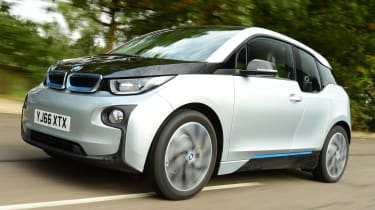
Price: £31,720Engine: 0.6 2cyl/electric, 168bhp
BMW’s game-changing i3 uses a clean-sheet approach, with bold looks, a lightweight structure and neatly packaged cabin. A 168bhp electric motor gives 130 miles or so, while a two-cylinder petrol engine acts as a range-extending generator.
Mitsubishi Outlander PHEV Kotu

Price: £31,749Engine: 2.0 4cyl/electric, 201bhp
Britain’s best-selling EV combines rugged SUV looks with eco-friendly plug-in capability. It’s not the sharpest car to drive and feels low-rent inside, but attractive pricing and the sheer space on offer make it a top choice for families wanting to go green.
Figures
| Volkswagen Golf GTE Advance | Toyota Prius PHV Business Edition Plus | Kia Optima PHEV | |
| On the road price/total as tested | £29,635/£31,525 | £29,195/£31,240 | £33,995/£34,540 |
| Residual value (after 3yrs/36,000) | £14,339/48.4% | £12,204/41.8% | £13,190/38.8% |
| Depreciation | £15,287 | £16,991 | £20,805 |
| Annual tax liability std/higher rate | £577/£1,155 | £569/£1,139 | £611/£1,222 |
| Annual fuel cost (12k/20k miles) | £1,346/£2,243 | £1,067/£1,779 | £1,248/£2,080 |
| Ins. group/quote/road tax | 26/£544/£140 | 21/£621/£140 | 25/£939/£140 |
| Cost of 1st/2nd/3rd service | £288 (2yrs) | £185/£335/£185 | £429 (3yrs/30,000) |
| Length/wheelbase | 4,276/2,630mm | 4,645/2,700mm | 4,855/2,805mm |
| Height/width | 1,484/1,799mm | 1,470/1,760mm | 1,465/1,860mm |
| Engine | 4cyl in-line/1,395cc | 4cyl in-line/1,798cc | 4cyl in-line/1,999cc |
| Electric motor power/battery | 75kW/Li-ion | 68kW/Li-ion | 68kW/Li-ion |
| Peak power/revs | 201/5,000 bhp/rpm | 121/N/A bhp/rpm | 202/6,000 bhp/rpm |
| Peak torque/revs | 350/1,600 Nm/rpm | 142/3,600 Nm/rpm | 375/2,300 Nm/rpm |
| Transmission | 6-spd twin-clutch/fwd | CVT/fwd | 6-spd auto/fwd |
| Fuel tank capacity/spare wheel | 40 litres/foam | 43 litres/foam | 55 litres/foam |
| Boot capacity (seats up/down) | 272/1,162 litres | 191/1,204 litres | 307 litres/N/A |
| Kerbweight/payload/towing weight | 1,615/500/1,500kg | 1,530/325kg/N/A | 1,780/420kg/N/A |
| Turning circle/drag coefficient | 10.9 metres/N/A | 10.2 metres/0.25Cd | N/A/0.25Cd |
| Basic warranty (miles)/recovery | 3yrs (60,000)/1yr | 5yrs (100,000)/1yr | 7yrs (100,000)/1yr |
| Service intervals/UK dealers | Variable/223 | 10,000 miles (1yr)/208 | 10,000 miles (1yr)/187 |
| Driver Power manufacturer/dealer pos. | 24th/28th | 16th/4th | 14th/9th |
| NCAP: Adult/child/ped./assist/stars | 94/89/65/71/5 (2012) | 92/82/77/85/5 (2016) | 89/86/67/71/5 (2015) |
| 0-60/30-70mph | 6.8/5.8 secs | 10.7/10.6 secs | 8.1/7.4 secs |
| 30-50mph in 3rd/4th | 2.9/4.1 secs | 4.2 secs* | 3.4/4.5 secs |
| 50-70mph in 5th/6th | 5.8/7.3 secs | 6.4 secs* | 6.9/9.8 secs |
| Top speed/rpm at 70mph | 138mph/2,250rpm | 101mph/N/A | 119mph/N/A |
| Braking 70-0/60-0/30-0mph | 44.9/29.1/8.5m | 48.4/38.0/10.7m | 51.2/37.0/10.6m |
| Noise outside/idle/30/70mph | 62/38/65/71dB | 57/46/64/70dB | 71/53/63/71dB |
| Auto Express econ (mpg/mpl)/range | 47.3/10.4/416 miles | 57.2/12.6/541 miles | 48.9/10.8/592 miles |
| Govt economy combined/weighted | 53.4/156.9mpg | 82.0/282.0mpg | 57.6/176.6mpg |
| Govt economy combined/weighted | 11.7/34.5mpl | 18.0/62.0mpl | 12.7/38.8mpl |
| Actual/claimed CO2/tax bracket | 160/40g/km/9% | 114/22g/km/9% | 133/37g/km/9% |
| Airbags/Isofix/park sensors/camera | Seven/yes/yes/£265 | Seven/yes/£250/yes | Six/yes/yes/yes |
| Auto box/stability/adap. cruise/AEB | Yes/yes/yes/yes | Yes/yes/yes/yes | Yes/yes/no/no |
| Climate control/leather/heated seats | Yes/£1,750/yes | Yes/no/yes | Yes/no/yes |
| Metallic paint/LED lights/keyless go | £570/yes/£365 | £545/yes/yes | £545/yes/yes |
| Sat-nav/USB/DAB radio/Bluetooth | Yes/yes/yes/yes | Yes/yes/yes/yes | Yes/yes/yes/yes |
